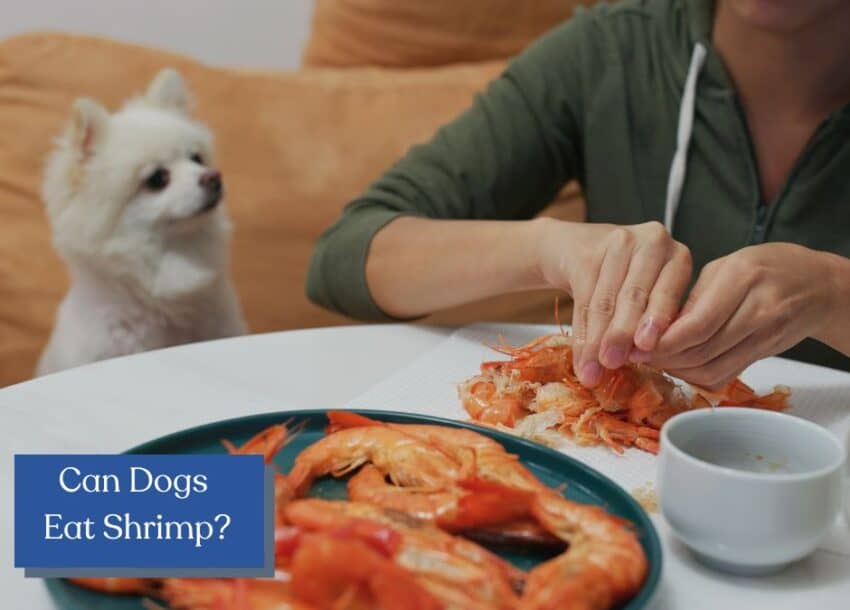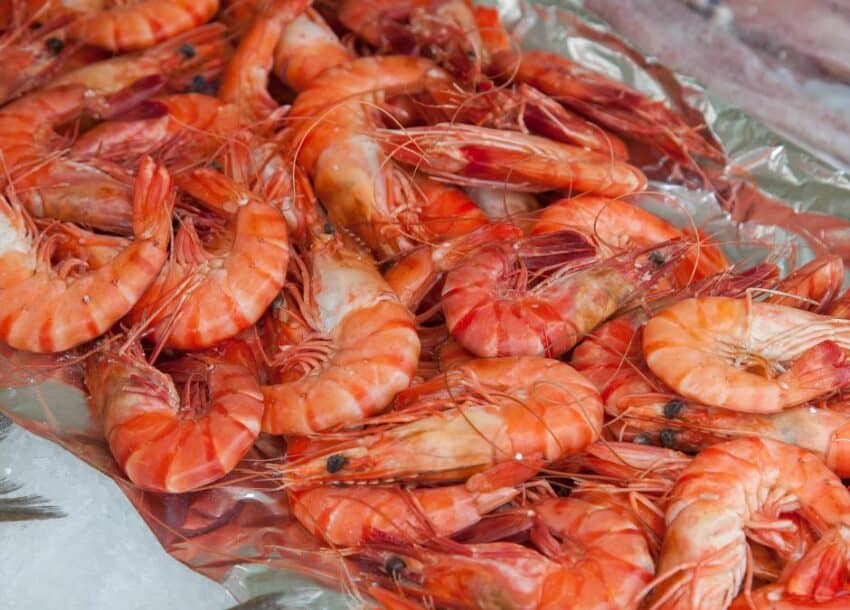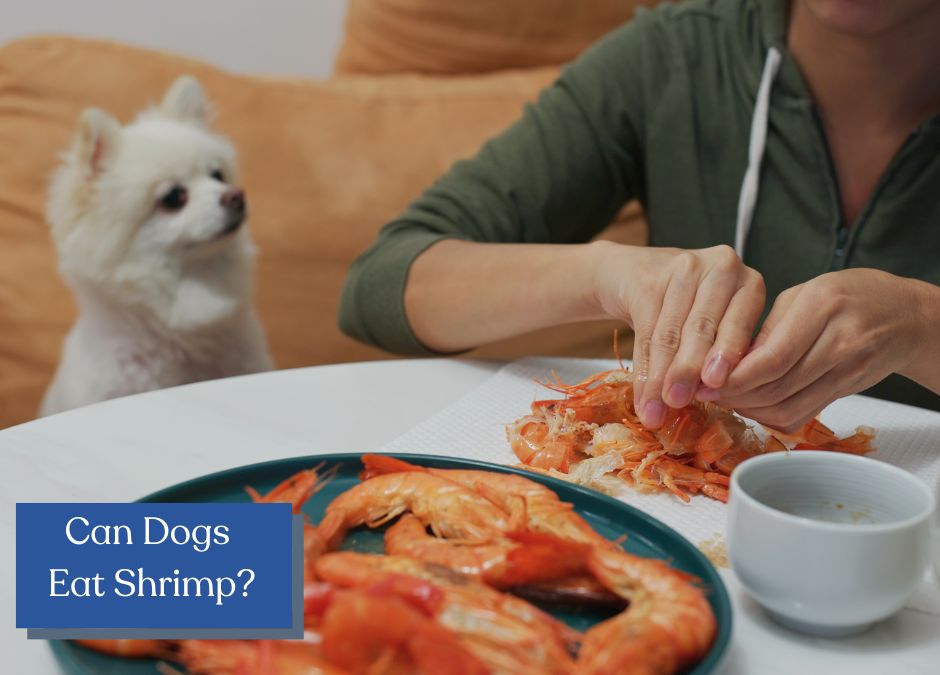Ah, our furry four-legged companions, they never cease to amaze us with their insatiable appetite for… well, just about anything! As a dog health writer, I’m constantly bombarded with questions like, “Can dogs eat this? Can dogs eat that?” And one particular query that often pops up is, “Can dogs eat shrimp?” If you’re a seafood lover, you might be tempted to share your succulent shrimp with your pooch. But before you go diving into a shrimp feast with your furry friend, let’s delve into the topic and explore the facts.

A Seafood Surprise: The Benefits of Shrimp for Dogs
If you’re a seafood aficionado (which, honestly, I’m not), you’re probably aware of the numerous health benefits that shrimp can offer. But what about our canine companions? Can they enjoy these tasty crustaceans while reaping any rewards?
Surprisingly, the answer is yes! Shrimp can provide some health benefits for dogs when consumed in moderation. Here are a few reasons why shrimp might be a good addition to your dog’s diet:
High-Quality Protein Powerhouse
Shrimp is packed with protein, which is an essential nutrient for dogs. Protein plays a vital role in muscle growth, repair, and overall development. Including shrimp in your dog’s diet can contribute to meeting their protein needs.
Omega-3 Fatty Acids: Promoting a Shiny Coat and Healthy Joints
Shrimp contains omega-3 fatty acids, which are known for their anti-inflammatory properties. These fatty acids can help reduce inflammation, support healthy joints, and contribute to a lustrous coat for your furry friend.
Essential Vitamins and Minerals
Shrimp is a rich source of essential vitamins and minerals, including vitamin B12, phosphorus, and selenium. These nutrients are important for various bodily functions, such as energy production, bone health, and immune system support.
Before You Dive In: Considerations Before Feeding Shrimp to Your Dog
Now that we’ve established that shrimp can have benefits for dogs, it’s important to consider a few factors before indulging your pup in a shrimp feast. Remember, moderation is key, and not all dogs will react the same way to shrimp. Here are a few things to consider:
Allergies and Sensitivities
Just like humans, dogs can have allergies or sensitivities to certain foods. Shrimp, being a shellfish, is among the common allergens for both humans and dogs. Before introducing shrimp into your dog’s diet, consult with your veterinarian.
As it turns out, while dogs, in general, can eat shrimp, my dog cannot. She’s allergic to it. In fact, it’s the ONLY food she’s allergic to. She has sensitivities to some foods, but not outright allergies. If you’re curious about the difference, check out Food Intolerance vs. Food Allergies in Dogs: What’s the Difference?
The Importance of Moderation
While shrimp can provide health benefits, it’s super important to offer it in moderation. Too much of a good thing can sometimes lead to problems. The high protein content in shrimp may put a strain on a dog’s kidneys if consumed excessively. Additionally, overindulging in shrimp can lead to an upset stomach, causing diarrhea or vomiting.
Preparation and Seasonings
When preparing shrimp for your furry friend, keep it simple. Avoid using seasonings or additives such as salt, garlic, or onion powder, as these can be harmful to dogs. Plain, boiled or steamed shrimp without any additional flavorings is the way to go. Also, be sure to remove the shells and tails, as they

Preparing Shrimp for Your Pooch
Now that we’ve covered the benefits and considerations, let’s dive into the process of preparing shrimp for your furry friend.
Choose High-Quality Shrimp: Opt for fresh, high-quality shrimp to ensure that you’re providing the best for your dog. Avoid shrimp that has been seasoned, breaded, or processed with additives.Shell Removal: Remove the shells and tails from the shrimp before serving it to your dog. Shrimp shells can be a choking hazard and may also cause digestive issues. It’s important to take extra care and ensure that no small pieces of shell remain.Cooking Methods: The best way to prepare shrimp for your dog is by boiling or steaming it. Avoid frying or using oils and seasonings that are harmful to dogs. Boiling or steaming helps retain the nutritional value of the shrimp while making it easier for your pup to digest.Serving Size: When introducing shrimp to your dog’s diet, start with small portions to see how they react. Monitor their digestion and overall well-being before gradually increasing the serving size. Remember, moderation is key!Introduce Slowly: As with any new food, it’s important to introduce shrimp slowly into your dog’s diet. Offer a small piece at first and watch to see how they react. If there are no adverse reactions or digestive issues, you can gradually increase the amount over time.Watch for Allergic Reactions: Keep a close eye on your dog for any signs of allergic reactions after introducing shrimp. These can include itching, redness, swelling, hives, or difficulty breathing. If you notice any of these symptoms, discontinue feeding shrimp immediately and consult your veterinarian.
Shrimp for Dogs: A Treat to Savor in Moderation
So, can dogs eat shrimp? The answer is yes, but with a few important considerations. Shrimp can offer health benefits to your furry friend, such as being a rich source of protein, omega-3 fatty acids, vitamins, and minerals. However, it’s crucial to remember that not all dogs will react the same way to shrimp, and moderation is key.
Before adding shrimp to your dog’s diet, consult with your veterinarian to ensure it is safe and appropriate for your specific pup. Consider any allergies or sensitivities they may have and introduce shrimp slowly, monitoring their reactions and digestion.
When preparing shrimp for your furry friend, keep it simple and avoid using any seasonings or additives that could be harmful to dogs. Remove the shells and tails, and opt for boiling or steaming as the preferred cooking methods.
FAQs about Dogs & Shrimp
Can dogs eat shrimp tails?
It’s best to remove the shrimp tails before feeding them to your dog. Shrimp tails can pose a choking hazard and may cause digestive issues if consumed.
Can dogs eat raw shrimp?
It’s generally recommended to cook shrimp before feeding it to your dog. Raw shrimp may contain bacteria or parasites that can be harmful to dogs. Cooking the shrimp thoroughly helps eliminate any potential risks.
Can dogs eat fried shrimp?
Fried shrimp is not recommended for dogs. The breading and frying process typically involves the use of oils, seasonings, and additives that can be harmful to dogs. Additionally, the high-fat content of fried shrimp may lead to digestive issues for your furry friend.
Can puppies eat shrimp?
Puppies can eat shrimp in moderation, but it’s essential to introduce new foods gradually and monitor their reactions. Consult with your veterinarian before adding shrimp to a puppy’s diet to ensure it aligns with their nutritional needs and any specific dietary requirements.
Can dogs eat shrimp shells?
It’s best to remove the shrimp shells before feeding them to your dog. Shrimp shells can pose a choking hazard and may cause digestive issues if consumed. Stick to offering your dog the meat of the shrimp without the shells.
Can dogs be allergic to shrimp?
Yes, dogs can be allergic to shrimp. Shrimp is considered one of the common allergens for both humans and dogs. Before introducing shrimp into your dog’s diet, consult with your veterinarian and consider conducting an allergy test to ensure your furry friend can safely enjoy this seafood delight.
Can dogs eat frozen shrimp?
Yes, dogs can eat frozen shrimp, but it should be thawed and cooked before serving. Ensure that the shrimp is properly defrosted and cooked to eliminate any potential bacteria or parasites that may be present in raw frozen shrimp.
Can dogs eat shrimp cocktail sauce?
Shrimp cocktail sauce usually contains ingredients such as onions, garlic, spices, and potentially high levels of salt, which can be harmful to dogs. It’s best to avoid offering shrimp cocktail sauce to your furry friend.
Remember, while shrimp can be a tasty treat for your dog, it should never replace their regular balanced diet. Use it as an occasional addition or a special reward, and always prioritize their overall health and well-being.
So, next time you’re enjoying a delicious shrimp dish, you can share a small shrimp snack with your pup, knowing that you’re both indulging in a delightful treat together!


